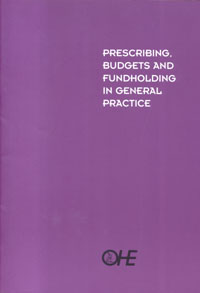Unlocking the Value of Combination Therapies

In April 1991, a radical programme of public health care reform was introduced by the Conservative Government. The avowed intention of the programme was to improve the overall quality of health care whilst simultaneously moderating the growth in costs. Within the general reform…
In April 1991, a radical programme of public health care reform was introduced by the Conservative Government. The avowed intention of the programme was to improve the overall quality of health care whilst simultaneously moderating the growth in costs. Within the general reform package, prescribing in general practice was a particular focus of attention. The preparatory White Paper (CM 555, 1989) noted that prescription medicines formed the largest single expenditure item for the Family Practitioner Services and observed that the cost of medicines was ‘more than the cost of the doctors who wrote the prescriptions’ (p.57). In the five preceding years, the cost of drugs had risen at tour per cent per annum over the rate of inflation.
The central framework of the government’s reform programme was the internal market, or the ‘purchaser-provider split’, entailing a necessarily prominent role for devolved budgeting. Within general practice, indicative drug budgets were introduced, the intention being to ‘place downward pressure on expenditure… without in any way preventing people getting the medicines they need. In this way prescribing can be improved and wasteful expenditure avoided, for the benefit of the NHS as a whole’ (p.58). Over and above indicative drug budgets, the government also introduced the voluntary fundholding scheme for general medical practitioners (GPs). A late addition to the reform package, fundholding was always one of the most controversial and most criticised aspects of Conservative health policy. The scheme was introduced without prior appraisal and with minimal consultation. Being untested, no contemporary evidence was available on the potential costs or benefits to the health service, to patients or to the general practitioners who were to operate the scheme. As fundholders’ budgets covered their anticipated prescribing expenditures, consequences for prescribing were to be expected.
Even after seven years, our knowledge base with respect to the effects of budgeting, especially fundholding, on prescribing in general practice remains limited, and is based on independent academic studies and a few official reports. This document reviews and draws conclusions from the available evidence. The next chapter provides the necessary background to the ensuing discussion, by outlining the nature of the restructuring of public sector health care occasioned by the 1990 NHS Act. The following chapter reviews the series of policy initiatives directed towards prescribing, focusing especially on the fundholding scheme and the parallel indicative prescribing budget scheme initiated for non-fundholders. In Chapter Four, the evidence of independent studies of the effect of budgeting on prescribing is reviewed and evaluated, as are the results of the investigations conducted by the Audit Commission. The document concludes with conjectures as to the future of budgeting and prescribing cost control.
A discussion of the impact of budgeting, especially fundholding, on prescribing is particularly pertinent at the present time. Towards the end of its term of office, the Conservative Government mapped out a framework for primary care development (Cm3390, 1996) which appeared to envisage an increasing diversity of organisational forms. Prior to its recent election victory, the Labour Party had been perceived as being antipathetic to fundholding, although early evidence regarding the new government’s intentions suggests that fundholding is to be retained whilst new commissioning models are developed (NHS Executive, 1997). Although it is quite conceivable that fundholding in its present form may eventually disappear, it is by no means improbable that any newly-emerging structures (such as locality purchasing) will have much in common with it. An assessment of the successes and failures of prescribing budgets to date can therefore usefully inform the current policy debates.
Prescribing, Budgets and Fundholding in General Practice
Baines, D., Tolley, K. and Whynes, D.
(1997) Prescribing, Budgets and Fundholding in General Practice. OHE Series on Health. Available from https://www.ohe.org/publications/prescribing-budgets-and-fundholding-general-practice/